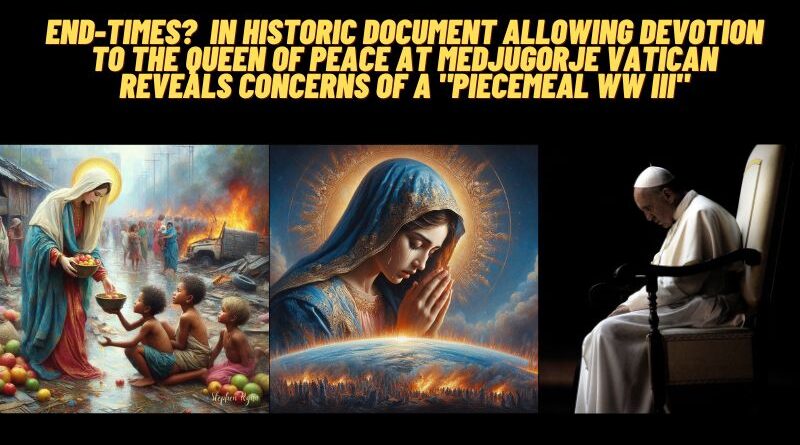In Historic Document Allowing Devotion to the Queen of Peace at Medjugorje Vatican Reveals Concerns of a “Piecemeal WW III”
Inside the historic document declaring that devotion to Medjugorje is allowed and encouraged there was also a short prayer to the Queen of Peace asking her to “hear the pleas” of humanity because the world is succumbing to a “third world war fought in piecemeal.”
The prayer: “Queen of Peace, pray that those who freely accept the spiritual proposal of Medjugorje may live ever more united with Jesus Christ and find true peace of heart in him.
To you, we also entrust this world of ours, which is succumbing to a “third world war fought piecemeal.” Queen of Peace, hear the plea that rises from the hearts of children, young people, the poor, and every person of goodwill.“
Pope Francis on “Piecemeal World War III”: A Call for Global Unity and Peace
Pope Francis has recently raised alarm about what he describes as a “piecemeal World War III.” This term captures his concerns over the fragmented and persistent nature of global conflicts, which, rather than being characterized by a single, large-scale war, manifest through a series of localized wars, humanitarian crises, and escalating tensions around the world.
Understanding the Concept
Pope Francis first introduced the notion of a “piecemeal World War III” in 2016, as he sought to draw attention to the myriad of conflicts that plague different regions. He emphasized that these conflicts—ranging from the Syrian civil war to violence in Africa and tensions in the Middle East—are interconnected and represent a broader pattern of global strife.
Key Messages from the Pope
- A Call to Awareness: The Pope stresses the need for global awareness about the consequences of indifference to suffering. He warns that neglecting the plight of those affected by these conflicts leads to a dangerous normalization of violence. His messages urge individuals and nations to remain vigilant and engaged in humanitarian efforts.
- Interconnectedness of Conflicts: In his addresses, Francis often highlights how conflicts in one part of the world can have ripple effects globally. He argues that the international community must recognize these interconnections to effectively address the root causes of violence and foster lasting peace.
- Dialogue and Diplomacy: Central to the Pope’s vision is the importance of dialogue over armed conflict. He advocates for diplomatic solutions, urging leaders to prioritize negotiation and cooperation rather than resorting to military might. This approach, he believes, is essential to breaking the cycle of violence and building a sustainable peace.
- The Humanitarian Crisis: Pope Francis has also focused on the humanitarian consequences of these fragmented conflicts. He calls attention to the plight of refugees and displaced persons, emphasizing that they are often the innocent victims of larger geopolitical struggles. His appeals for compassion and solidarity with those suffering reflect his deep commitment to social justice.
- Moral Responsibility: The Pope reminds individuals and nations of their moral responsibility to seek peace. He often invokes the concept of fraternity, urging humanity to act as a single family rather than as divided nations. He believes that a collective response to global challenges is essential for overcoming the current crises.


